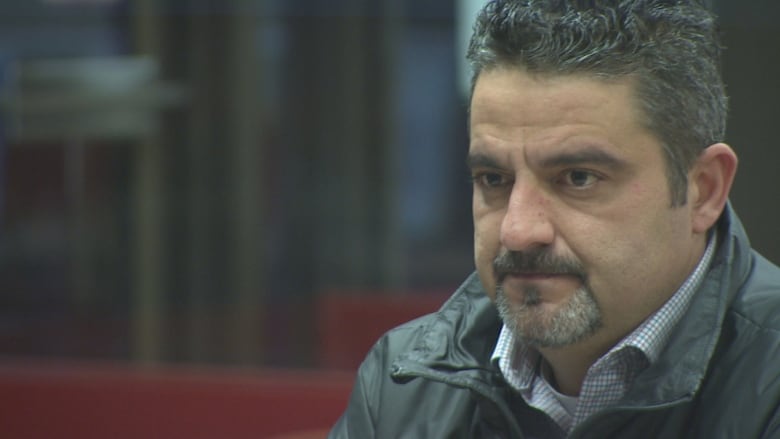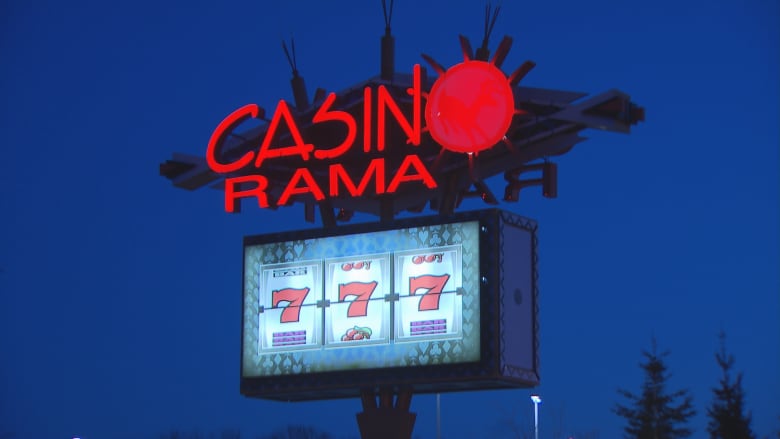'Nobody stopped me' at the casino: Ontario self-exclusion program fails to keep gambling addicts out
Facial recognition technology was set up to spot self-excluding gamblers who would be asked to leave

Despite promoting responsible gambling, the Ontario government's program to help addicts stay out of casinos is failing to do so, an investigation by CBC's The Fifth Estate has found.
Gambling addicts interviewed by The Fifth Estate said that while on the Ontario Lottery and Gaming Corporation (OLG)'s self-exclusion list, they entered OLG properties on a regular basis.
"For that first six-month period, I went back probably 10 times," said Joe Frieri, a gambler in the Greater Toronto Area who self-excluded three times over three years.

Frieri figures he'd lost up to $300,000 before self-excluding the first time in 2008. He was wrestling with his addiction, and says he felt he needed the OLG's help.
"In this case, I couldn't do it on my own anymore."
Even though he was on the list, Frieri said he was never stopped from entering casinos in Ontario.
"I went back with the same notion to gamble and I did," he said. "Nothing prevented me from going in, nobody asked me questions."
- WATCH | The Fifth Estate "Gambling on Addiction" Friday at 9 p.m. on CBC-TV
- New OLG online gaming site promises to pad provincial coffers
He told The Fifth Estate the only time he was approached while self-excluded was when a member of casino staff offered him a player's card — like a frequent flyer program.
The OLG is mandated through the Alcohol and Gaming Commission of Ontario, the organization responsible for regulating alcohol and gaming in the province, to promote responsible gambling in its casinos.
Paul Pellizzari, executive director of policy and social responsibility for OLG, said they are "very proud of and very confident in our program."
Facial recognition technology
One of the tools the government agency now uses to keep addicts out of casinos is the self-exclusion program, an approach that's used widely across North America.
In Ontario as of 2015, all 24 OLG slots and casinos were equipped with facial recognition technology, an initiative that cost the corporation almost $500,000.

If a gambler chooses to take part in the self-exclusion program, their photo is taken and their name and picture are entered into an electronic database that is used in every casino and slot facility in Ontario.
If the gambler is detected by a facial recognition camera, a cashier or a member of security staff, the gambler will be asked to leave and can be fined for trespassing on casino property, according to the program.
Despite all of this, many experts see self-exclusion as a way for gaming corporations to show they are doing something to help without actually helping.
"It's a concerted public relations campaign that deflects attention away from problematic products and industries," said Natasha Dow Schull, a cultural anthropologist at New York University and author of Addiction by Design.
Schull spent 15 years studying casinos, gamblers and electronic gaming machines (EGMs) in Las Vegas.

She said it's problematic to expect addicts will be able to keep themselves out of casinos.
"It puts [the responsibility] all on the person. [Saying] you manage yourself. I'm not going to alter the algorithms in this machine; I'm not going to alter its accessibility to you, the times of day at which you can play it, I'm not going to put limits on how much money you can spend."
Off the mailing lists
In Ontario, there are more than 20,000 people on the self-exclusion list. Figures from the OLG obtained through a freedom of information request show that in the period from July 2016 to October 2017, 3,755 people on the list were detected on OLG properties.
There's no doubt that they exploit addicted gamblers, it's their stock in trade.- Sean Dewart
"We detect over 3,000 people every year… we're going to look at how we can improve it," Pellizzari said. "[The] more important point is that people who sign self-exclusion agreements and enter the program need to take control of their gambling, they need to take all the steps that will help them."
The program also promises gamblers they will be removed from mailing lists so as to not entice them to come back, and that they won't be able to claim any prize won over $10,000.
But gamblers and others tell The Fifth Estate the program rarely excludes those who are on the list.

"I was still self-excluded and I went back, walked in to Woodbine and I just started all over again," Frieri said. "I was cashing my pay cheques, taking it there … starting to borrow from banks, starting to borrow from loan sharks again.
"Nobody stopped me. Nothing."
It's unclear whether facial recognition technology was in place while Frieri entered OLG facilities.
The Fifth Estate also put the self-exclusion program to the test. Fifth Estate producer Scott Anderson signed up for a six-month self-exclusion.
To sign up, he had to attend an OLG property — in this case, OLG Slots at Woodbine Racetrack in Toronto. He was taken into a security office where he provided his personal information and the OLG took his picture.
Anderson then tried to enter four OLG casinos in southern Ontario in one day. At each casino, he walked in, gambled at EGMs and cashed out without being detected.
The Fifth Estate showed the above video to the OLG's Pellizzari.
"We provide supports to self-excluders by training our staff, by providing disincentives, by providing facial recognition, by providing our security officers to look for players," he said.
"No one element is going to be foolproof because it is not designed to be foolproof."
'Stock in trade'
The findings of The Fifth Estate investigation came as no surprise to lawyer Sean Dewart, who has represented more than a dozen gamblers who have sued the OLG for negligence in allowing them to enter casinos while self-excluded.
"There's no doubt that they exploit addicted gamblers, it's their stock in trade," said Dewart.
In Canada, there are more than half a million Canadians who are considered problem gamblers, recent studies out of Alberta show.
Those gamblers account for a disproportionately high share of government-run casinos revenue, said University of Lethbridge Prof. Robert Williams, a researcher at the Alberta Gambling Research Institute.

"Fifteen per cent to 50 per cent of gambling revenue comes from that one per cent to four per cent of problem gamblers," said Williams, who is considered one of the leading experts in the field of gambling and addiction in Canada.
"Governments should be in the business of not exploiting the people, but serving the people, and it's hard to see how they're serving the people by disproportionately taking money from that vulnerable segment."
For the Ontario government, there's a lot of money at stake from gambling.
The OLG brought in more than $7 billion dollars in gross revenue last year — $2.2 billion of that went straight into government coffers.
Williams has done studies that estimate up to 24 per cent of that total $7-billion revenue comes from problem gamblers.
Pellizzari said eight to 12 per cent of OLG's client base have a gambling problem.
What about showing ID?
For government casinos, it's easy to stop problem gamblers from entering, Williams said.
"The industry sometimes says that the public would never accept showing ID at a casino. But you've got to show your ID when you go to the bank to cash a cheque. You look in your wallet, you probably have 50 IDs for various things you have to routinely do. "
In most countries, he said, government ID must be shown to enter a casino.
"There are no long lineups. In fact, you can automate it by just scanning it.… There's lots of automated ways to have more reliable detection system and it's just North American casinos ... are choosing not to do it."
In at least 18 cases over the past six years, self-excluded gamblers have tried to sue OLG for negligence for letting them in casinos. Dewart has represented more than a dozen of those cases.

"In the same way as tobacco companies can be liable for putting a dangerous product into the marketplace, it's a similar idea to that OLG can be liable for negligence," Dewart says.
In many cases, the OLG has opted to settle the matters quietly out of court.
"[The OLG] frequently get the money back, which is to say there is a settlement that ends up in my clients' pocket, and my clients do what all addicts do which is they go right back into a casino, so in some cases I'm quite sure OLG is cognizant of the fact that the money is just going to in a circle," Dewart says.
"They also didn't want to test, are disinclined to test, the case legally because if it goes badly for them, there probably will be a lot of claims."
OLG declined to comment on the lawsuits, but Pellizzari said its program "helps thousands of people every year."
As for gamblers like Frieri, he wants to ensure what happened to him doesn't happen to anyone else.
"I might not be able to save myself in the end, but I just want to save somebody," Frieri says. "I know I have the ability to save somebody [by speaking out]."
